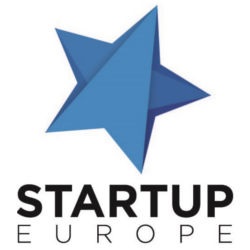EU Commission's 2012 forecasts for the European Economy : = "Turning point" ?
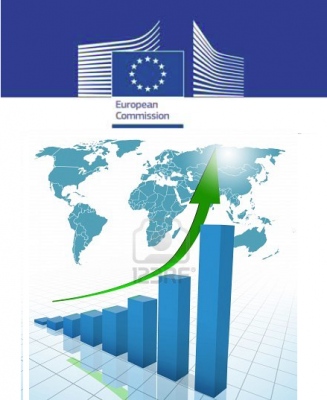
- "Confidence ...seems to have Begun Improving Recently" on the EU, according to the latest Data just published by the European Commission, which finds "signs of Stabilisation" concerning EU's "Financial Markets", expects notable "Growth to resume in the 2nd half of this year (2012)", and observes that EU "expands" its "Industrial output", while USA its "Consumption", (according to the Difference of Strategies used), etc. So that, added also to the "Decisive steps for the comprehensive crisis response" already "taken by Europe recently", this may be a Positive "Turning point of the trend", depending also on decisions to be taken on forthcoming EU Summits, particularly from March.
------------------------------
Germany and France, as well as the UK (thanks also to the Olympic games, as EUCom. notes), are due to continue Growing steadily during 2012, for +0,6% and +0,4% (according to the French Government +0,5%), and +0,6%, respectively, together with Luxembourg (+0,7%), Austria (+0,7%), Ireland (+0,5%), Finland (+0,8%), Malta (+1%), Slovakia (+1,2%), Estonia (+1,2%) from €uroarea, and Denmark (+1%), Bulgaria (+1,4%), Romania (+1,6), Latvia (+2,1%), Lithuania (+2,3%), and Poland (+2,5%), from the rest of EU Countries. Bad surprises being Greek economy's recession of -4,4%, in order to pay loans and interests for notoriously excessive State agents' salaries/retirements, and Portugal's - 3,3%, according to recovery Plans, (which, however, don't reach the .. Double-digit numbers of Baltic Countries' Past recession during the 2009 Global Crisis : from -14,3% to -17,7% !)..
But, what is most important, given the Sustainable Growth Model adopted by the main EU Countries focused on Investment for Productivity, is that Growth starting now is driven by Exports' surplus, (even vis a vis the advanced USA economy, as also other recent Data contained in a relevant "€uroFora"'s earlier NewsReport begun to clearly indicate).
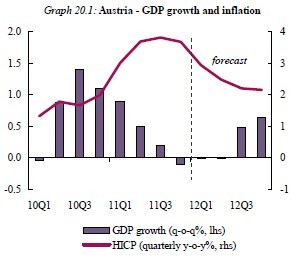
F.ex., in the case of France, EUCom. notes that, already, "in the last quarter of 2011, GDP Growth proved much more Resilient than had been forecast ...: . .Investment rebounded to +²0.9%", while, at the same time, "Net Exports were Strong", already in 2011, and "Net Trade ....would have an overall Positive contribution to growth in 2012" too. Similarly, Austria's "robust growth" recently was due to 'Strong Exports, Investment, exports, Investment, and, not least, Public (but Not Private) consumption", according to EUCom. Germany's "continued Investment in machinery and equipment" and "Dynamic Exports", also explained its recent Boom, together with an internal augmentation of Employment according to EUCom, but, in 2012 it's due to zig-zag much more according to the ups and downs of Exports, than a still "benign" private consumption, revealing what is its essential driving force. Same even more in the UK, where "in 2011, Growth was largely driven by External Demand", which " is again expected to be the strongest Driver of GDP growth in 2012", according to developments in its "main Export markets". Slovakia's "economic activity (was) Driven by Growth in Exports in Durable Manufacturing goods", and, while Internal "Consumption" remains "low", its "Growth largely dependent on External demand", 4/5 being destinated to EU's Single Market. Finland too depends very much on "External Demand"'s ups and downs, but "a Positive impact on Growth" is expected also by "Investment" during "on-going Structural Changes within some of the main Finnish Industries", most of whom play a key role for "Finnish Exports". Estonia's 2011 entry in €uroarea coincided with Growth based on "remarkable Export performance", as well as "fixed Investment ..targeted at increasing Productivity", and 2012 outlook is due to follow mainly the ups and downs of "External demand", (as; f.ex. the "Export-oriented Electronics sector" already showed), but also rely on "robust Infrastructure Investment ...(with a) higher absorption of EU Structural Funds". (etc).
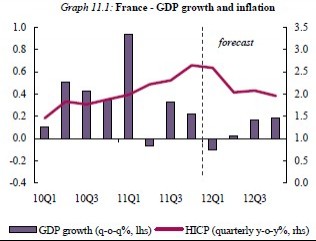
------------
In particular :
According to EU Commission's cautious interim Forecasts, (which "decided to extend the coverage from the 7 biggest Members States to all 27 Member States"), "the Key-messages are the following :"
- "We are seeing signs of Stabilisation" in the EU, while "World Trade Growth ... is expected to Recover ...gradually in 2012" despite "the continuation of the temporary weakening of Global Demand". So that, even if "GDP of the EU is expected to remain Unchanged in 2012", nevertheless, "the Global Purchasing Managers Index (PMI) ...continues to indicate modest Expansion of Industrial output" in the EU.
The situation is sightly Differend in some other "Advanced economies", (as in) the U.S., (where) recently (it was) ...Consumption (that) rebounded".
" ..in Japan ...the perspective of moderate Growth in 2012 remains intact".
"Many Emerging market economies continue to do (even) Better", so that, "Overall, the Global economy –excluding the EU - is expected to Grow by +4.3% in 2012".
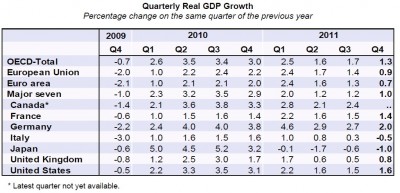
----------------------------
"Financial markets remain Fragile still, but there are also signs of Stabilisation".
"Sovereign yield Spreads have Eased in several countries, ... spreads have come Down since mid-November in recognition of the determined Measures by vulnerable countries and at European level. The Successful sovereign bond auctions are further Evidence".
The real situation may be even Better Today, since, "as regards credit conditions for the private sector,... the data were collected until December, so may not fully take into account Latest Improvements"
"..New liquidity Measures by the ECB have contributed to the improvement, as Banks have now access to Longer maturity Funding, and can use a Wider Range of eligible collateral. ...Credit conditions are not expected to constrain Investment and Consumption over the forecast horizon.
"Moreover, the European Banking Authority reported earlier this month that the reCapitalisation plans do not point to massive deleveraging, as some had initially feared"
-----------------------------------
>>> "...Confidence ...seems to have Begun Improving Recently"
"The Commission's Economic Sentiment Indicator (ESI) ... in January 2012, ..rose for the first time since May 2011".
"This (may) constitute a Turning point in Confidence, ...depend(ing) on the policy decisions at national and EU level".
+ "The EU composite PMI readings have been slightly more Positive, showing a gradual Increase of the index since November" 2011. "On January (2012), the index stood Above the threshold of 50 points, signalling a marginal Increase in economic Activity in the EU. The February reading, which came out yesterday, seems in line".
So that a short, "...expected slowdown will be mild and temporary", before "the Turnaround of the trend", expected during 2012.
---------------------------------
"Given these preconditions, our growth Forecast looks as follows :"
=> "...we expect Growth to resume in the 2nd half of this year (2012)"
-------------------
"...uncertainty related to the sovereign-Debt crisis will gradually Fade over the forecast horizon".
---------------------
- "...Inflation has Decreased ... gradually", despite "récent increases of indirect taxes".It "is expected to trend on a slowly Decreasing path over the forecast horizon. For 2012 as a whole, the HICP inflation rate is now projected ....2.1% in the €uro area.
----------------------
Last but ot least : "Europe has recently taken decisive steps for the comprehensive crisis response, in 5 points" :
1) "..uncertainty about a second programme for Greece has been removed.."
2) "..Good, but not yet sufficient, progress has been made to establish an adequate Firewall against contagion in sovereign-debt markets. I believe that will be resolved next week in the (EU) Summit".
3) "..a better Capitalisation of EU Banks is well underway and funding stress has eased", (thanks also to ECB's adequate action).
4) "..The framework for economic Governance in the euro area has been reformed and is being implemented as it should"
5) "..structural Reforms to enhance our growth potential are being undertaken. ....We will... bring together the Growth-enhancing policies across the EU, both at national and at EU level".
-------------------------
+ Meanwhile, other recently published data show that €uroArea's Countries succeeded in 2011 to drastically ...halve their Foreign Trade Deficit compared to the Past of 2010, Reducing it from 14,7 Billions € to 7,7 Billions €, (i.e. almost - 50% !), probably due, at least partly, also to Competitiveness' gains.
On the contrary to the other, Non-€uro, 10 EU Countries' Deficit was slighty Reduced just from 159 to 152 Billions €. In overall, EU's 27 reduced their past Foreign Trade Deficit with China from 155 to 145 Billions €, and with Japan from 20 to 17 Billions €. during 2011.
Only EU's Foreign Trade Deficits with Russia and Norway augmented in 2011, ( from 66 to 82, and from 33 to 42 Billions €, respectively), apparently due to Energy imports. A need that recently growing frindings of Oil/Gas around EU Member Cyprus might soon start to diminish in the Future.. Moreover, Norway is part of the European Economic Area, while neighbouring and largely European Country Russia has a close strategic partnership with the EU, so that it's difficult to count them as being totaly distinct from -and/or out of-Europe...
***
(NDLR : DraftNews, as already sent earlier to "EuroFora"s Subscribers/Donors. A more accurate, full Final Version might be published asap.)
***
Main Menu
Home Press Deontology/Ethics 2009 Innovation Year EU endorses EuroFora's idea Multi-Lingual FORUM Subscribers/Donors FAQs Advanced search EuroFora supports Seabird newsitems In Brief European Headquarters' MAPs CoE Journalists Protection PlatformBRIEF NEWS
- 00:00 - 02.06.2021
- 00:00 - 18.10.2020
- 00:00 - 19.06.2020
- 00:00 - 18.05.2020
- 00:00 - 20.04.2020
- 00:00 - 02.02.2020
- 00:00 - 09.12.2019
- 00:00 - 27.11.2019
- 00:00 - 16.11.2019
Popular
- Yes, we could have prevented Ferguson riots says World Democracy Forum's Young American NGO to ERFRA
- Spanish People Elect CenterRIGHT Majority with 1st Party and Total of 178 MPs (6 More than the Left)
- Pflimlin's vision
- The European Athletic "Dream Team", after Barcelona 2010 Sport Championship Results
- Source Conseil d'Europe à ERFRA: Debatre Liberté d'Opposants à Loi livrant Mariage+Enfants à Homos ?
- Head of BioEthics InterGroup, MEP Peter Liese : "Embryonic stem cell research reaching its END" !?
- Spain: Jailed Turkish Terror suspect with Explosive,Drones,Chechen accomplices stirs Merah+ Burgas ?
- UN Head Ban Ki Moon at CoE World Democracy Forum : - "Listen to the People !"
Latest News
- EUOmbudsmen Conference 2022: Digital Gaps affect People's Trust threaten EF Project on EU Future ?
- French Election : Black Out on Virus, but Obligation for Fake 'Vaccines" Challenged
- Both French Presidential Candidates point at "Humanism" in crucial times...
- France : Zemmour = Outsider may become Game Changer in Presidential + Parliamentary Elections 2022
- PACE President Cox skips Turkey Worst (Occupation) case compared to Russia (DeMilitarisation) query
Statistics
Visitors: 58990584Archive
Login Form
Other Menu
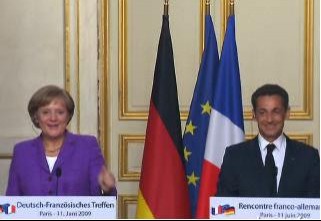
The official presentation of a "Program" respecting People's choices voted in the June 7, 2009 EU Elections, to be debated in EU Council and EU Parliament during its 1st Session on July in Strasbourg, is the No 1 Priority, according to Democratic principles, for the Franco-German axis, said the main winners at the ballot box, French President Nicolas Sarkozy and German Chancellor Angie Merkel.
They stressed that the New EU Commission's President must have a "Program" in favor of an EU which "protects" its Citizens, regulates financial markets and aims at a "Political" Europe" : a wording they have used as incompatible with Turkey's controversial EU bid.
They also declared ready for a "political" endorsment of "Mr. Barroso's candidacy" in June's EU Council, considering that an official decision would have to be made after EU Parliament's debates and votes, possibly from next month (July), with the legally necessary final acceptance shortly after Lisbon Treaty's entry into force, hoped for September or October.
- "A Program, and Mr. Barroso" : This resumes, in substance, the anouncements made by Sarkozy and Merkel, on the question of current EU Commission's President, Barroso's declared wish to succeed to himself for a second mandate, to be extended during the following 5 years.
In their 1st meeting after EU Elections, they observed that "the Franco-German axis counted in European Elections' campaign... But, we both keep a realistic view : We saw the number of those who abstained, and we must absolutely give them an answer. We also see the disilusionment of an important number of Europeans vis a vis Europe, and we are aware of the responsibilities we have".
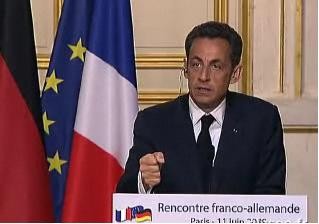
- The "Duty" of the new EU Commission's President, after June 7, 2009 EU Elections' result, "is to act for a Europe which protects the Europeans, to commit himself into working for a better Regulation of Financial transactions, ... and to have a Political will for Europe", underlined Sarkozy.
Therefore, "we have asked M. Barroso... to clarify, to officialy present the intentions he has", he anounced.
- "We want to speak also about the Programme", explained Merkel.
- "It's important that for the next EU Parliament's mandate (2009-2014) we take the right Decisions for Europe. Obviously on Persons, but mainly Decisions on Issues", she stressed.
- "It's not simply a question of a Person, it's also a question of a Programme". We are "really asking Mr. Barroso to commit himself on a Program, and on Principles, on Values", Sarkozy added.
EU President-in-office, Czech Prime Minister Jan Fischer, accepted the Franco-German stance :
- "Barroso must present his Programme. The Czech Presidency agrees with that", Fischer reportedly said later, after meeting Sarkozy.
But Press reports from Brussels claimed that Barroso had preferred to be officially appointed by EU Council since June, (i.e. next week), "because this was implied by the current Treaty of Nice, according to him", and considered any delay until the possible ratification of the new, Lisbon Treaty on September/October, as "undemocratic".
- "At any case, independently of what Germany and France ask, it's also EU Parliament's wish". "We shall propose Mr Barroso's candidacy... But even in the framework of Nice Treaty, EU Parliament has to be associated in this Decision", the French President observed.
If this is correctly done, then "we support Mr. Barroso's candidature", and "if the (EU) Parliament agrees, we might ratify this decision since July", (i.e. next month), they both said.
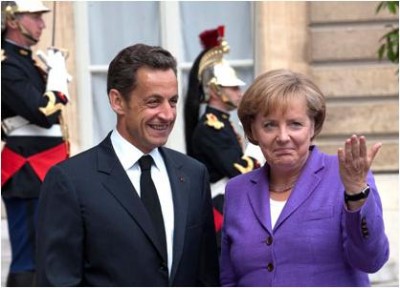
- "France and Germany support Baroso's candidacy, But we want to speak also on the Program. We believe that this Program should be established in close cooperation with EU Parliament, and that's why we have followed an appropriate way", said Merkel. - If EU Parliament wants, this election can take place on July, but this must be done in full agreement.
- "We shall support Mr. Barroso's candidacy, without doubt", said Sarkozy. "But we have asked from Mr. Barroso, as I told him yesterday, to put into detail.. his intentions, at the eve of his 2nd mandate, if the situation avails itself.
France and Germany "don't want to take an Official Legal Decision by writting" during "the next (EU) Council" (on June 18-19), declared Sarkozy. Because they prefer, at this stage, only "a Political decision" on June, "so that we (EU Council) can work together with EU Parliament", which starts to meet only Next Month, since July in Srasbourg, "leaving a Legal decision by writting for later".
- "If the Conditions are fuillfiled in EU Parliament, we (EU Council) are ready to give the agreement and make it offficial", said Merkel
- "But, now we are working in the base of Nice Treaty. If tommorow we want to work in the spirit of Lisbon Treaty, we have to find a proper way", she added.
- "Of course it's Legally complicated, because we are going to make a Political proposal to the forthcoming Council, for an EU Commission's President, on the basis of Nice Treaty : So, we (EU Council) will not appoint the Commissioners. Only the President. If EU Parliament agrees, it could endorse this position on July", explained Sarkozy.
But, on Autumn, "if Ireland ratifies Lisbon Treaty, there will be, at any case, a 2nd Decision, to appoint the Commission's President, this time on the basis of Lisbon treaty, and then, we, the EU Member States, would have to appoint (also) the EU Commissioners", he added.
As for the precise Timing : - "Everything is suspended until the Irish vote... Now, we must all make everything possible to help Ireland to say "Yes"" to Lisbon Treaty... The Irish Referendum, ..will take place either on September or on October. It's a Question which depends on the Irish. And, then, we shall have the Choice of the Candidates for the permanent Institutions of Europe".
However, "if Ireland says No, we, French and Germans, have to assume our responsibilities, and we'll do so", he concluded.
But British and Swedish governments were reportedly eager to have a final EU Council decision on Barroso since this month, on June's European Council. While the other EU Member Countries are divided, several of them preferring to wait until EU Parliament pronounces itself, on July, and/or until Lisbon Treaty might be ratified by Ireland at the beginning of the Autumn. Barroso's current mandate ends on November.
There are also various, contradictory and/or unpredictable reactions inside EU Parliament vis a vis Barroso's wish to continue a 2nd mandate, because many MEPs are openly or secretly opposed, reluctant, or hesitating.
In the biggest EU Countries, as France and Germany, EU Citizens voted on June 2009 EU Elections for a renovated, non-technocratic but Political Europe which cares for its Citizens, with an Identity, Values and Borders, declared incompatible with Turkey's controversial EU bid, by mainstream, pro-European Governing Parties. Similar choices were also supported in several other small or medium EU Countries.
On the contrary, whenever, in other Countries, Governing and other mainstream Parties didn't make these choices or eluded them, EU Citizens massively voted for euro-Sceptics whenever they were the only ones to to promise anti-bureacratic change and oppose Turkey's demand to enter into the EU, (f.ex. in the UK, Netherlands, etc).
It's seems to be an Open Question whether Sarkozy and Merkel's conditions will be really accepted by Barroso, who was appointed on 2004 in a different political context, (with Socialist Prime Ministers in Germany, France, etc), had rejected in the Past the idea of EU becoming "equal to the USA" as "ridiculous", and pushed for Turkey's contoversial EU bid, trying to "soften" or contain the changes desired by the People who voted for Merkel and Sarkozy with another policy vis a vis Turkey on 2005 in Germany and on 2007 in France, as they did all over Europe on 2009.
In addition to many EPP Governments, it's 3 remaining Socialist Prime Ministers : Gordon Brown in the UK, Zapatero in Spain, and Socrates in Prortugal, who support Barroso, as well as Liberal Swedish Prime Minister Reinfeldt. But their Parties lost the June 2009 EU Elections.
Questioned whether there was still "Time" for "other" possible "Candidates", Sarkozy and Merkel did not deny, nor made any comment on that, but simply said that "it's not for us to make publicity for any candidates. We anounced our choice ("A Program, and Mr. Barroso"). But we respect any other candidate".
Among various other names cited are former Belgian Prime Minister Verhofstadt, former UNO's Human Rights Commissioner Mary Robinson of Ireland, Italian former EU Commission's vice-President Monti, etc. Meanwhile, Luxembourg's PM Juncker, (who had been unanimously accepted by EU Council for EU Commission's Presidency on 2004, but refused), announced his intention to resign from "EuroGroup"'s Chair. Thus, he might be available for another Top EU job.
As "EuroFora"'s "opinion" said (See publication dated 9/6/09) : - "If the current candidates (i.e. Barroso, etc) to the Top EU jobs promise and guarantee to respect People's democratic choices, then, it's OK".
"Otherwise, Europe must find new candidates, really motivated and able to implement these democratic choices of the People."
Because, "in Democracy, the forthcoming choices for EU's Top Jobs,...should be made according to EU Citizens' Votes in June 7, 2009 European Elections, and main EU Governments' strategic policies".














